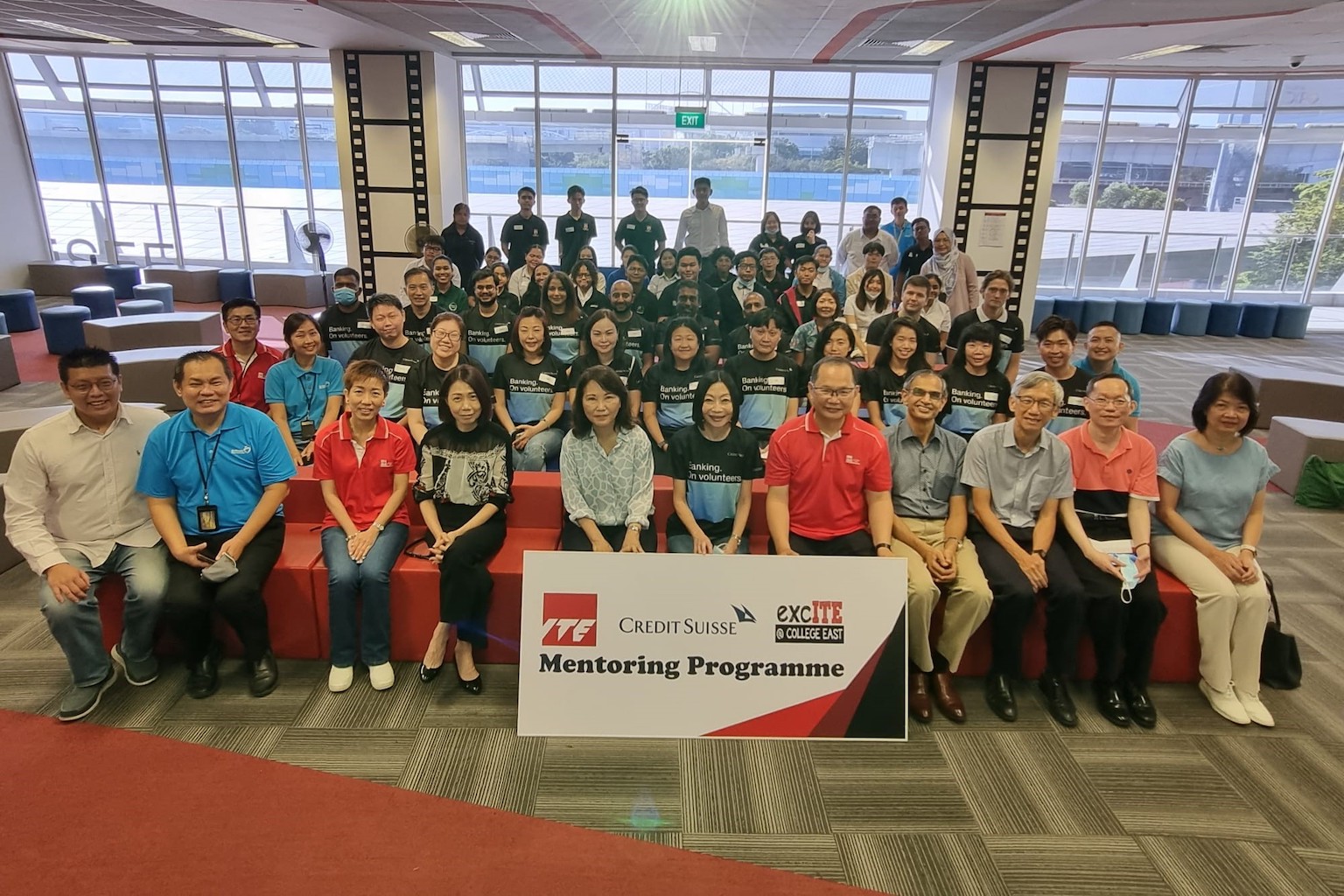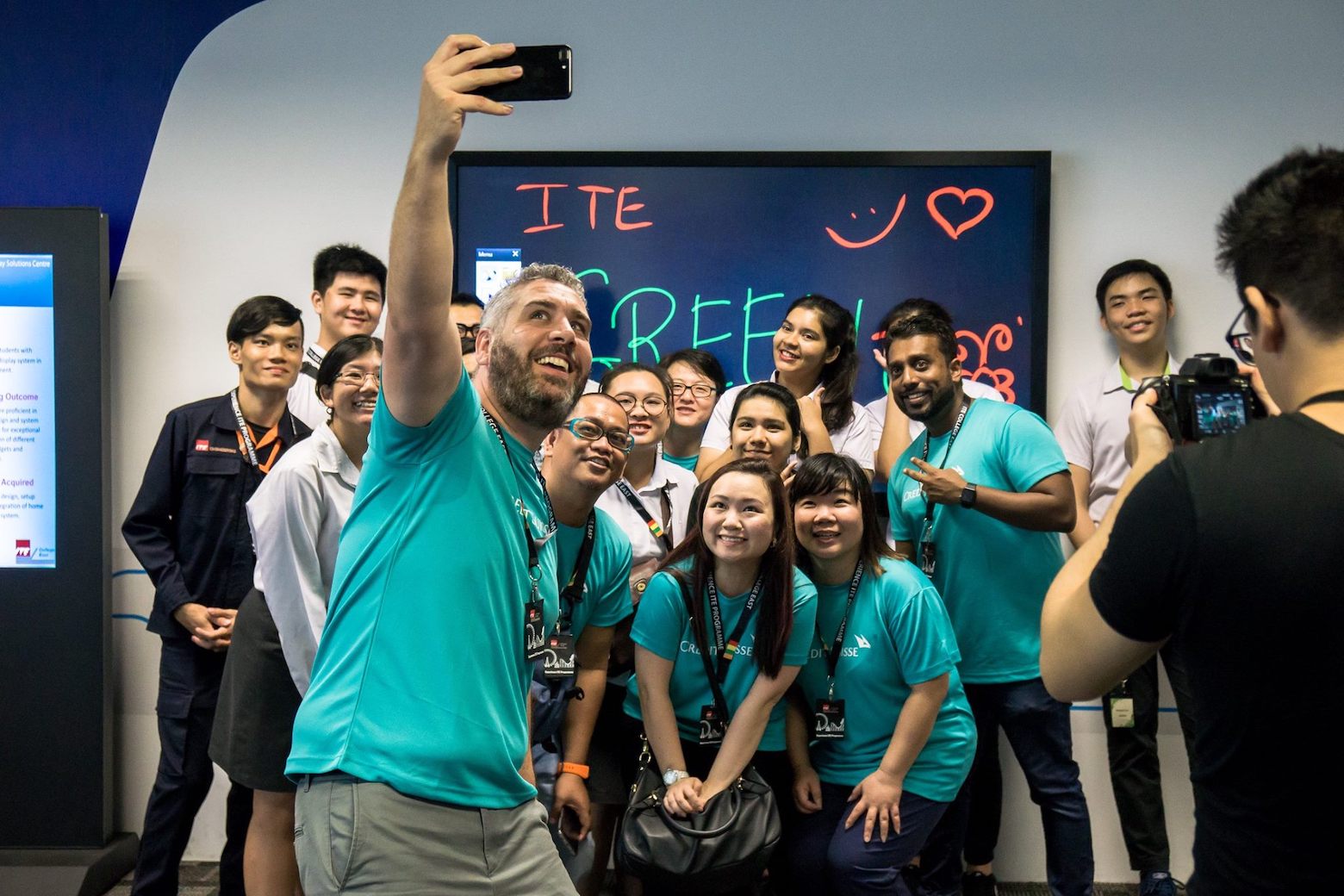BRANDED CONTENT
How local employees at this global bank gain from being youth mentors
There are mutual gains for companies that support and guide the young

Over 700 Credit Suisse employees have volunteered to be youth mentors in the last five years.
PHOTO: CREDIT SUISSE
Lyn Chan, Content STudio
Follow topic:
Peaceful huddles have been going on at the Kranji War Memorial. There, the young can be seen engaging with a group of adults.
The adults are from Swiss bank Credit Suisse, the young from the Institute of Technical Education (ITE). Both groups share a common purpose: To help youths reach their fullest potential.
The bank and its staff believe in investing time and effort in mentoring the young – with both parties enjoying the benefits of the engagement.
The bonus: Such purpose-driven initiatives by the bank also help to retain talent. How? When employees are engaged, they seize opportunities to develop and grow.
“Such programmes are key to unleashing the potential of youth while helping our employees to stay engaged which is key in retaining talent,” says Ms Liza Green, head of Corporate Citizenship & Foundations in Asia-Pacific at Credit Suisse.
Since 2015, the bank has been collaborating with ITE and social service organisation Bethesda Care Services (BCS) to mentor underprivileged ITE students under the excITE programme.
About 40 volunteers from the bank’s Singapore office connect with 30 to 40 students every year in the programme. It is “a good take-up rate”, says Ms Green.
Students would meet with their Credit Suisse mentors for four or five Saturday sessions over two to three months.
Driven by purpose
The employees were motivated to step up, support and guide youth seeking help. It was “100 per cent employee-driven”, says Ms Green.
“The champions had a clear vision of what the mentoring programme would look like – that is to have an impactful mentoring programme which would be of a value-add to the students.”

ITE College East was a “natural choice” because it is near the bank’s office in Changi, while BCS was the service provider.
Referring to BCS, Ms Green says: “It was essential (to have someone) with the experience and knowledge of working with youths.” She adds that the charity organisation was already engaging with the students through their activities centre at the campus.
There were challenges, one of which was ensuring the commitment of both the volunteers and the students to attend the mentoring sessions during precious personal time.
Credit Suisse, which has similar youth-centric programmes in other countries, created dynamic sessions with engaging topics such as building resilience and financial literacy. This included occasional outdoor sessions.
Kranji War Memorial and East Coast Park have been backdrops for bonding chats and activities between mentors and mentees. When an unexpected curveball occurred during the pandemic, affecting in-person meetings, Credit Suisse switched to a virtual mentoring format.
Participants in excITE would also engage in groups, unlike the conventional one-to-one structure. This format was by design. “It accommodates any absentees or ad hoc changes in the schedule of the volunteers and students,” Ms Green explains.
Nurturing the next generation
Beyond the bottom line, some companies are energised by initiatives that are both noble and beneficial. They invest in a culture that nurtures and inspires the young to achieve their full potential.
Therein lies the opportunity for mentoring, and the role of companies as part of Mentoring SG. “Building a strong mentoring culture is at the heart of Mentoring SG. We want to create a society where mentoring is part of a youth’s journey of growth and where they can benefit from a caring relationship and positive role model. With the support of partners, we can build a thriving mentoring community for our youths,” says Minister of State for Culture, Community and Youth & Trade and Industry Alvin Tan.
The Mentoring Alliance for Action (AfA) was launched in March last year to strengthen mentoring efforts and provide accessible mentoring opportunities to all youths in Singapore. It is a key initiative under Mentoring SG, which seeks to build a mentoring ecosystem among stakeholders to enhance the development of youth.
Mentoring a win-win
The excITE programme is still going strong after eight years. It now covers all three ITE colleges.
Perhaps the best indication of its success is seen from the enthusiasm of the mentors, who commit more than 12 hours each of their personal time when they take on the mantle of mentor.

And they, too, benefit. “Employees who participate in these mentoring programmes develop their leadership and other soft skills,” says Ms Green. “It also provides them with networking opportunities as it gives them the chance to interact with employees across different seniority levels and departments.”
Equally important, she says, is that “supporting our communities through such mentoring programmes also aligns with our (corporate) values, including partnership, inclusion and accountability”.
The bank shared lessons from their excITE experience at Mentoring SG’s corporate engagement session last month. The corporate business leaders-only event, attended by 17 representatives, aimed to raise awareness of the value of mentoring Singapore’s youth, and how companies have the capacity to transform a young person’s life.
For other companies keen to do the same, Mr Brian Liu, Mentoring AfA workgroup lead for Partnerships, says: “Mentoring SG is a great platform to kick off virtuous cycles of corporates broadcasting and amplifying their values, and the good work they are doing for their staff and for those in the community through mentoring.”
Mr Liu, 40, who is also senior vice-president of human resources at e-commerce platform Lazada, adds: “This, in turn, inspires other corporates to also participate and innovate, and this of course attracts talents as they have greater visibility as well as more information and access to leaders.”
Tapping corporate expertise
Mentoring programmes don’t all have to follow the path of Credit Suisse. For example, professional networking platform LinkedIn has a diverse range of mentoring initiatives.
“Beyond skills, networks play an outsized role in connecting people to opportunities – and mentoring is a very effective way to help level the playing field,” says its Social Impact manager Grace Seow, 45.
LinkedIn Coaches is the company’s signature social impact programme. Through a tie-up with non-profit organisations, LinkedIn employees can connect with, and offer much-needed professional support to, jobseekers facing barriers.
Youth are also included in LinkedIn’s efforts. LinkedIn Career Conversations, a partnership with youth development organisation Halogen Foundation, brings students and corporate volunteers together for learning and sharing sessions on navigating school-to-work transitions.

The volunteers come from companies such as accounting firm PricewaterhouseCoopers, financial data firm S&P Global, integrated facilities management company Sodexo, financial services company Visa, and LinkedIn.
“We are also exploring bringing together our employees from our regional offices and young people in Singapore to help local youths gain cross-cultural awareness and cultivate a global mindset,” says Ms Seow.
Another example is flexible space provider WeWork. In May, it started a year-long partnership with the Mentoring AfA to provide complimentary use of its 14 locations across Singapore to mentoring organisations.
Along with their mentoring partners – such as Voices of Asia and Yayasan Mendaki’s Youth Mentoring Office – mentoring organisations can “leverage WeWork’s conducive, engaging and safe spaces to facilitate insightful conversations and knowledge-sharing”, says Mr Balder Tol, general manager of Australia and South-east Asia at WeWork.
Mr Tol, 36, adds: “We believe there is value in bringing people together for a greater good, whether it is advancing social causes, giving back to the community or fostering collaboration.”
Be a part of the ecosystem
The fourth edition of the National Mentoring Summit on Dec 9 will mark the official launch of the Mentoring SG movement, reveal the achievements of the Mentoring AfA over the past year, and lay the foundation for the growth of the next generation.
The summit, which is free, will bring together mentoring organisations, corporates and education institutions to share their mentoring experiences, and foster collaboration among stakeholders to build a vibrant community.
- Want to be a part of the National Mentoring Summit? Head to mentoring.sg to find out more.
This feature is brought to you by the National Youth Council, in support of the Forward Singapore exercise


